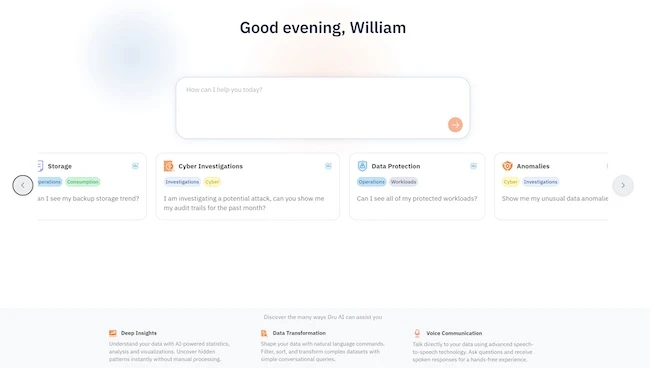Druva introduces multiple agents to automate critical tasks
Druva announced a major expansion to DruAI, the company’s suite of AI capabilities for customers. This expansion marks Druva’s next step in agentic data security, fundamentally changing the way customers secure, recover, and manage their data.

Built with Amazon Bedrock AgentCore on AWS, DruAI features DruAI Agents, intelligent agents that can interpret user intent, analyze data, and take meaningful action. This shift moves enterprises beyond traditional, query-based AI to agentic systems designed for action — helping teams strengthen cyber resilience with greater speed, simplicity, and confidence.
“At Druva, our vision is that AI will not only assist users, but also execute complex tasks, respond to threats in real-time, and deliver a dynamic user interface personalized to users’ needs,” said Jaspreet Singh, CEO of Druva. “Today’s announcement takes a leap forward in that direction. Agentic AI will completely transform how users interact with their software, and we’re embedding that functionality directly into our platform at no added cost to the customer. AI will significantly simplify data security, and we’re dedicated to ensuring customers stay ahead of constantly evolving cyber threats.”
“Druva continually innovates and advances new data security capabilities for customers,” said Rich Geraffo, VP & managing director, AWS North America. “Leveraging Amazon Bedrock AgentCore, DruAI now incorporates autonomous agents that can proactively secure, recover and manage customer data. This is a powerful example of how AWS enables partners to build secure, scalable, and truly intelligent solutions for customers.”
Use cases driving the future of agentic data security
DruAI accelerates outcomes by enabling agents to take action directly, eliminating manual steps in traditional workflows. DruAI simplifies data security by delegating tasks to a team of agents:
- Data Agents surface key signals and trends from telemetry, risk indicators, and history.
- Help Agents guide users by troubleshooting problems, investigating incidents, and recommending next steps.
- Action Agents carry out specific tasks, such as recovering workloads, creating protection policies, or adjusting retention to optimize cost.
Available starting now, these DruAI Agents unlock new use cases for customers:
Restore entire applications with a single command
Customers can now task DruAI with orchestrating full workload recovery, eliminating the need to manually piece together infrastructure components. For example, DruAI Agents can restore an EC2 instance, including its configuration, volumes, and associated networking — in one step using a simple prompt.
Understand risk and anomalies
DruAI streamlines cyber investigation by removing the need to dig through dashboards, logs, and alerts to understand what’s changed and what’s at risk. Data and Help Agents can automatically surface anomalies, flag suspicious patterns, and generate executive-level summaries to support faster decisions and responses.
Experiment with AI in a controlled environment
DruAI includes the option to use built-in synthetic datasets, allowing customers to test AI prompts, simulate recovery scenarios, and evaluate outputs — all within a secure sandbox. This helps teams validate results, explore new use cases, and train users before applying AI in production environments.
DruAI: Designed for the AI-first enterprise
Since its introduction, DruAI has become a core component of how organizations manage data security and cyber resilience. Over the past year, more than 3,000 customers and 10,000 users have relied on DruAI to help investigate and remediate issues, engaging in over 11,000 AI-powered conversations across recovery, configuration, and support workflows.
Measured impact to-date includes:
- 63% of customer issues are resolved directly with DruAI.
- Support cases requiring human intervention are resolved 58% faster with DruAI using telemetry-based context.
- Built with strict data integrity controls, DruAI has maintained a 0% hallucination rate.
Over the next 12 months, the company plans to advance DruAI’s capabilities across several key areas, including: reducing the average time-to-resolution for cyber investigations by up to 70%, enabling up to 90% of routine data protection tasks through natural language interactions, and shortening backup troubleshooting time from hours to minutes.
“The AI-powered account summary analysis is a meaningful update. I’m not in Druva every day, but I need confidence that our admins are keeping backup activity on track to stay ahead of risks,” said James Bopp, Sr. Director of IT at Roland Foods. “This instant analysis capability gives me that assurance in seconds, without sifting through data or reports. It’s the kind of visibility and intelligence that helps us move from checking status to proactively managing risk.”
Security, privacy, and stringent permissions at the core
Druva operates with zero-trust methodology and the most stringent compliance requirements, backed by global compliance including FedRAMP, SOC2, GDPR, IRAP, and more. By extension, DruAI is secure by design. DruAI leverages existing API integrations to extend the same set of rigorous permissions and access controls to data. That means DruAI does not allow users to access any data they are not authorized to access.
Built with Amazon Bedrock AgentCore, an AWS service for securely deploying and operating highly capable AI agents at scale, DruAI does not access or learn from customer data, which is encrypted on the Druva platform and is not shared with any third parties. Designed with isolated large language models (LLMs) and private Retrieval-Augmented Generation (RAG), DruAI ensures secure analysis and works exclusively with an organization’s metadata to safeguard its sensitive information.